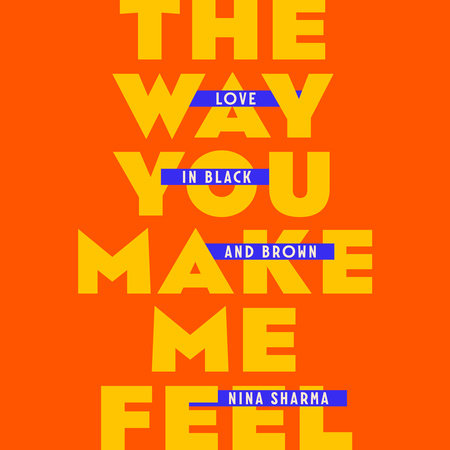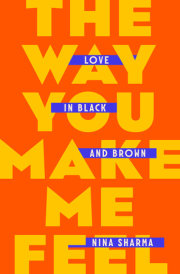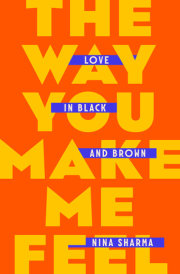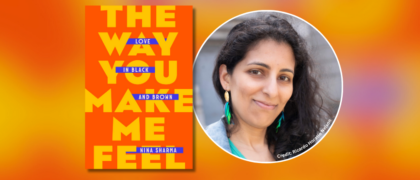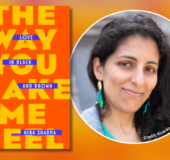Birthmark
My eldest sister, ten years older than me, is, as the saying goes, the fairest of them all. What I mean to say is that she's lighter skinned than both my middle sister, eight years older than me, and myself, "Baby." Ten shares my mother's milky coloring while Eight and I veer more toward my father's almond brown. But this is not the explanation my mother provides. "It's probably because she was born in England," she says and leaves it at that.
How could this be? I always think. My mother and my father are both doctors, and when it comes to the body, they tend to talk with precision. My sick notes for school were embarrassingly scientific-not just "Nina has a cold" but "Please excuse Nina from soccer. She has been suffering a rhinovirus infection."
But when it comes to melanin, or lack thereof, the language of science is drained of its color. We are, simply, dark or light, kali or gauri, born in the U.S. or born in England.
England, this suspension of science, this mythical, sunless country.
My parents' reminiscences of London and their bohemian Chelsea neighborhood are more often positive, if not star-studded-my mother seeing the Beatles play on a roof, my father encountering Mick Jagger and Tom Jones on his way to work at the hospital, and this child that seemed to carry an entire country on the dermis.
"Why did you leave?" I once asked.
"Because it was racist," my mother said-so quickly I almost missed it.
There is another set of stories that run a parallel track: the England where my mother had one child who passed away from birth complications before Ten was born, where the Swinging Sixties passed them by as they climbed up the ranks of medicine, where my father got his fondness for both biting British humor and heavy midday drinking, where my mother interrupted her residency to be a first-time mom. These are the shadow stories. They come out quick, if at all.
Their stories of America are more raw, glaring and open wounds even now. My mother can still picture the "bright yellow wallet" she could not find when she disembarked at JFK in 1972. She can still feel how tired she was all the time, "like I had been beaten." Sometimes the exposure is quite literal-the roof peeling off their moving truck, all their possessions open to the elements.
From the shores of Coney Island, they slowly crept inward, first to the Bronx, where Eight was born, a shade browner than the first kid, and then to central New Jersey, to the suburbs. There, in what would become an enduring Indian community, I was born, only to up the brown quotient just a bit more. Atop my ruddy newborn skin lay a big black birthmark. The mark was just above my butt, at the small of my back, the size of a potato or the palm of a hand.
I don't remember thinking much of the birthmark as I grew up. I could not even see it unless I looked in some kind of double mirror, which I never made an effort to do. I wasn't a fan of looking in mirrors.
But when I was ten years old my mother took me to a plastic surgeon, and before I could say "general anesthesia" the birthmark was lopped off.
All I remember is what came after-the big pad of gauze stuck on my back for weeks like some bulky diaper, and my mom forcing me on the bed, ass up. I cried and writhed as she yanked stitches out.
The surgery never healed properly, leaving a thick keloid in the shape of the number five. It is purple sometimes, red others. A rupture more than erasure. A color releasing more colors.
Twenty years later, my mom quips with a sneer and a grin both, "Maybe we can cut that off, too."
When I think of the Hindi words for black and white, kali and gauri, I can't help but think of the accompanying Hindu goddesses. Images of fair-skinned Mahagauri are scattered about the house and family home temple-a statue here, a picture there. Kali does not hold such a place. My first exposure to her was not through my devout parents but through
Indiana Jones and the Temple of Doom, the horn-headed evil cult leader chanting: "Kali-ma, Kali-ma!"
And yet, whiteness always seemed more like the big baddie to me. "She is so gauri," the auntie would praise. But I always heard
gory, heard it like a curse, a brutal thing. The two words have different etymologies-gory coming from the Germanic "gor" meaning dirt, gauri coming from Sanskrit: shining, bright.
It was the paradox of my life-to be told constantly to stay out of the sun to stay shining, light, and brilliant. To know that under the surface of their comments was not a fear of the sun but a fear of Blackness.
It was the paradox of my life-to know the racism my parents experienced at the hands of white America and yet to be saddened by how they desired to be white themselves.
It was the paradox of my life-to watch with family Black performers on stage and screen, to cheer for Black athletes, to benefit from the gains of the civil rights movement, Black Power, yet to meet their rejection of Black people in real life. Too long in the sun and I'd hear "you have become black!" which even then I understood was something to fear.
I didn't spend much time heeding this advice. Skin to me was an afterthought, a container for the body that I just wanted to take outside to play. I like to think I grew up to be someone who is not very preoccupied with coloring or appearance overall. I don't have a vanity table and my makeup bag consists of a blush brush but nothing to dip it in.
But maybe this isn't true. Maybe I gaze more than I know or want to acknowledge. For even now I can see it, more than I can see any other section of my body-that birthmark-and I must have looked at it more than I thought. I can see its deep black hue, a constant, nearly a perfect circle, a still and deep place, a place where all the light goes.
In my twenties, I gave the scar a story. A man I was dating asked about it. "I got it at Five Points. That's why it's in the shape of a five. That's how I joined the Five Points Gang!" My intention was never to tell a convincing lie; I didn't want to prove any sort of toughness. I was just sick and tired of being asked "What's that?" I kept the lie up for a few days, even bringing him to a brunch spot called Five Points. After fifteen minutes of looking worriedly into his pancakes he finally asked, "Are you okay to eat here?" He had believed what I thought was a very far-fetched tale. I dumped him soon after that.
A year later, I was in New York, lying in bed next to the man I would go on to marry, the man who, based on the color of his skin, my parents were hoping I would not marry, the man who was Black, whose skin was the same color as mine.
As the morning light poured in, I pried myself out of our tangle of brown limbs and bedding. I got up to go to the bathroom naked-the kind of naked that stretches out all over you like a ball gown. The bathroom door opened to a full-length mirror and I couldn't help but linger there a bit.
"You never asked about my scar." I did a big stretch and arched my back.
"I just assumed it was a tail," he joked.
"It was nothing big. A surgery." I set my hands to my hips and fanned my fingers, sliding them across keloid and skin.
"I'm sticking to cat tail," he said.
"You know, you are the first person who hasn't asked." My fingertips met the top of my butt.
"Because," he said, "whatever it was, you survived."
Copyright © 2024 by Nina Sharma. All rights reserved. No part of this excerpt may be reproduced or reprinted without permission in writing from the publisher.

